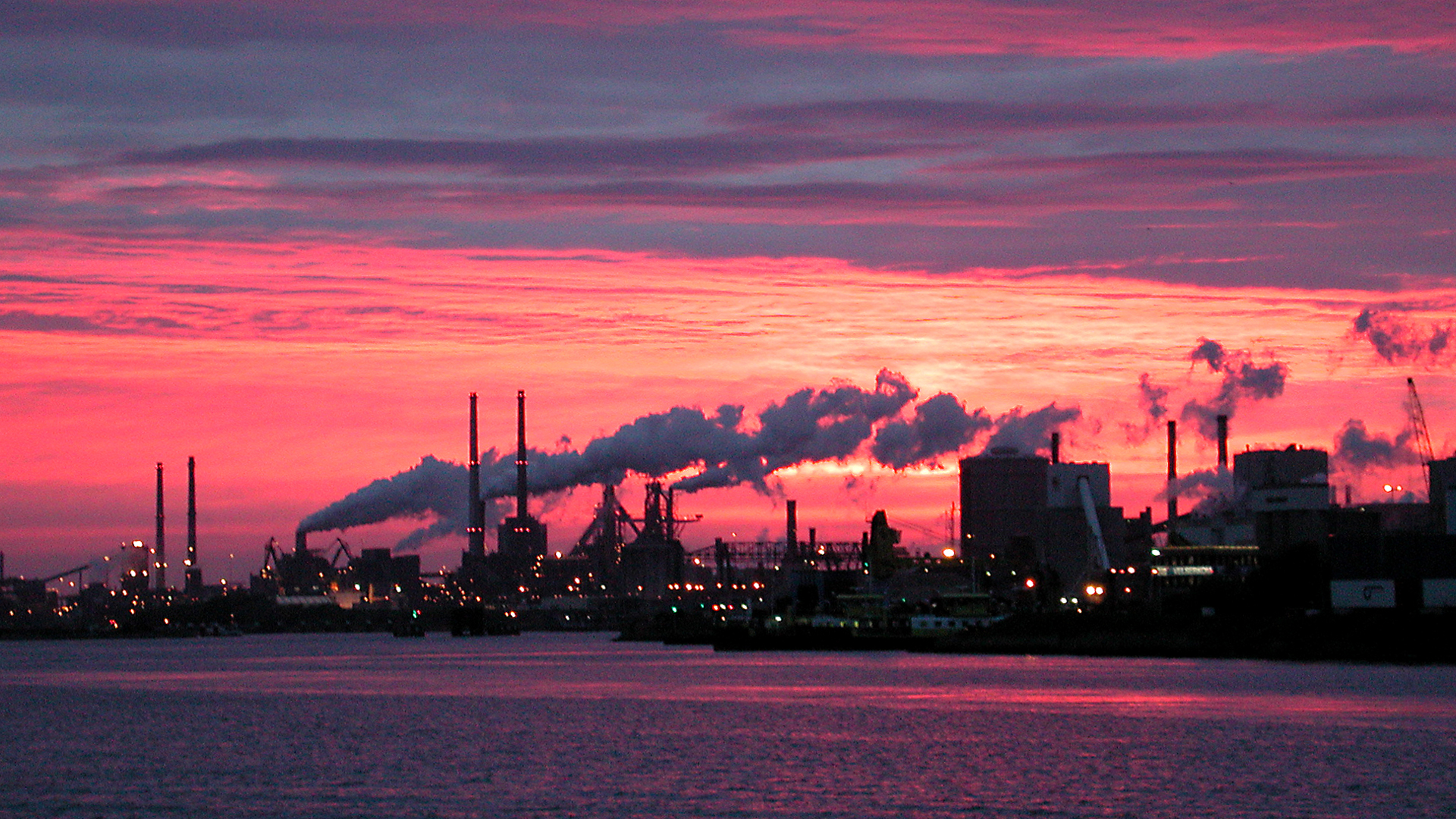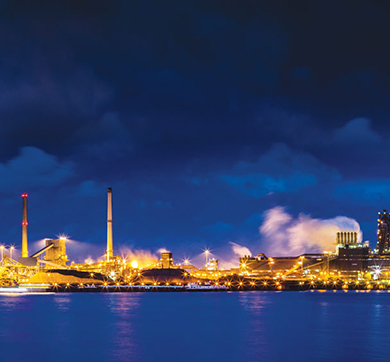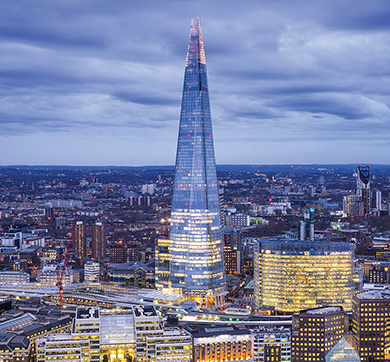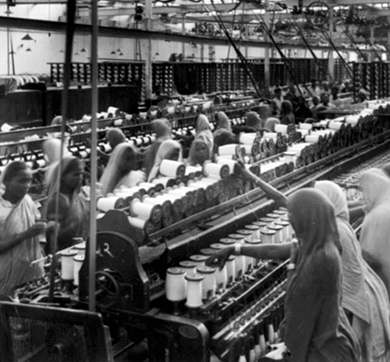June 2018 | 2192 words | 8-minute read
A special celebration is taking place at Tata Steel’s IJmuiden site in the Netherlands this year. The site was founded exactly 100 years ago as Koninklijke Nederlandsche Hoogovens en Staalfabrieken (Royal Dutch Blast Furnaces and Steel Factories).
To this day, the site’s 9,000 employees tell tales of how its founder Henri Wenckebach had the foresight to build a steel mill right next to the North Sea Canal. The location, close to Amsterdam, offers both direct access to the sea — the site has its own deep-sea port — and the inland waterways, railways and road network, which reach far into the continent. This has proved a crucial factor for success, enabling cost-efficient transport of raw materials to the site and fast delivery of endproducts to customers.
The IJmuiden site is the main hub of Tata Steel in the Netherlands, which also comprises downstream production locations elsewhere in the country. In turn, it is part of Tata Steel in Europe — the third top steel producer in the region — which was acquired by Tata Steel in 2007, when it was still called Corus. IJmuiden produces around 7 million tonnes of high-quality strip steel a year, serving customers in the automotive, engineering, packaging and construction sectors. The company’s other main hub is in the United Kingdom (UK), with steelmaking facilities in Port Talbot, Wales.
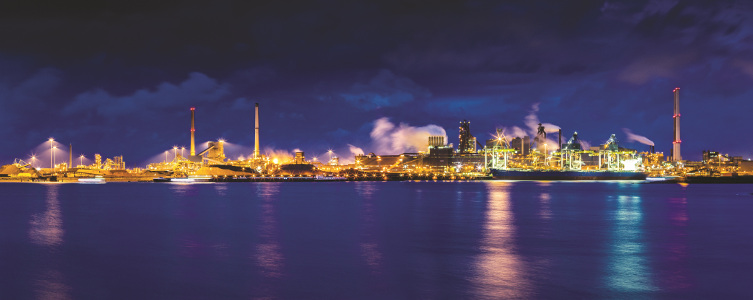
“Our hub in IJmuiden is the largest of our European operations,” says Hans Fischer, CEO and CTO of Tata Steel in Europe. “Working together with colleagues from the UK, Germany, France and elsewhere, IJmuiden is an important part of our European value chain. As one of the world’s most efficient and modern integrated steel sites it plays a key role in our mission to build the leading European steel business that is sustainable in every sense.”
Tata Steel in Europe is currently in the process of forming a potential joint venture with the European steel business of Thyssenkrupp; the intended new company would have its headquarters in the Amsterdam region.
Integrated Production
Being an integrated steel site means all production stages of the process of making strip steel are present on site at Tata Steel in IJmuiden. From raw material treatment to making liquid iron, steel, and hot and cold-rolling, IJmuiden has the capability to produce advanced steel products that meet even the most exacting customer needs.
“Our installations are among the industry’s largest and most advanced and we continue to invest in them,” says Annemarie Manger, director engineering, Europe. “One of our biggest projects at the moment is the construction of a new continuous caster, which will enable us to create even more grades of advanced high-strength steel. Such products offer our customers in the automotive industry, for example, more options for light-weight cars.”
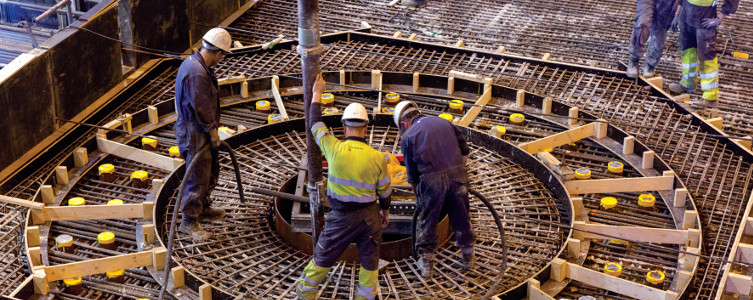
The site’s three galvanising lines offer customers further value by treating steel with an anti-corrosion zinc layer, using a patented technology. “These zinc-coated products find their way not just into cars of many major brands, including BMW, Volvo, Volkswagen, Ford and Renault, but also in many other applications. We are proud to also develop future applications for our steel. One of our current initiatives is to co-develop the hyperloop, a future transportation system, in which steel plays a major role,” says Annemarie.
Cold-rolling, pickling and painting, IJmuiden can do it all. “Throughout the decades, we have made sure to continue upgrading our installations, always with an eye on the long-term needs of our customers,” Annemarie continues. “In recent years, we have focused further on making strip steel only, allowing us to apply our full resources into improving even more what we are already good at, strengthening our market position, and that of our customers.”
The USP of Steel
In a rapidly evolving industry such as steel, innovating isn’t a choice for steel producers; it is essential in order to remain competitive. Today, members of the steel sector are competing for business with producers of alternative materials, as well as each other. At Tata Steel in Europe’s main Research and Development centre in IJmuiden, Ernst Hoogenes, director, research and development, is keenly aware of this pace of change.
“We are working on many levels, finding solutions for present-day needs while developing the next generation of steel products. At the same time, we are reinventing the iron making process in a unique new installation, which has the potential to drastically reduce carbon emissions,” Ernst explains. “These are European efforts, but they take place here in IJmuiden.”
One of Tata Steel’s main strengths is the ability to work with customers on co-developing products and services based on a thorough understanding of their markets, their products and their challenges. “We form teams of experts — engineers, researchers, commercial colleagues — that directly work with similar teams at our customers, organising workshops to share our expertise,” Ernst says. “We are regularly recognised by our customers for this proactive approach.”
Tata Steel in Europe has recently repositioned itself to become a leader in sustainable steelmaking. “Steel is unique in being fully recyclable,” Ernst continues. “We see a bright future for steel as customers and society as a whole, are moving towards a circular economy in which nothing goes to waste. Our products fit perfectly in this trend. We have been involved in various projects, such as fully demountable buildings, that demonstrate this fact.”
Tata Steel also sees ways to apply its advanced products to support the company’s values. “A great example of this is our mobile canning concept, which offers farmers in hard-to-reach regions a way to can their produce straight from the land,” says Ernst. “This reduces food waste and increases their income, while also providing a fully sustainable steel packaging product using our patented Protact® technology. We are working with several partners to get these mobile canning lines on the road.”
A Sustainable Business
The Tata Steel site in IJmuiden is built in a dune landscape on the North Sea coast. The coastal dunes are home to a wide variety of rare species of plants and animals. Sand lizards, nightingales, foxes and seagulls share their home with the natterjack toad, the grasshopper cane, the argus butterfly and rare orchids. There’s a moss species not found anywhere else in the Netherlands: the lime purple stump.
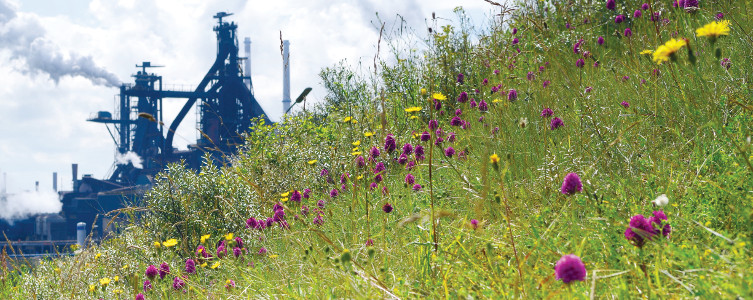
Recently, even a seal was spotted in one of the site’s waterways. “Many people don’t expect heavy industry and nature to go together, but they do here in IJmuiden,” says Hans van den berg, hub director. “We are working with partners in ecological conservation to protect our thriving wildlife and support its further development. We’re also organising nature excursions to enable people from the community to enjoy these delights.”
“At the same time, we are also very much aware that heavy industry can impact the communities around us, which is why we are investing in various ways to reduce dust emissions or noise from our site,” Hans continues. The plant uses revolutionary HIsarna technology that has the potential to reduce carbon emissions by at least 20 percent. IJmuiden is already world-class in its carbon footprint, emitting 1.7 tonnes of CO2 per tonne of steel — with the global average at 4 tonnes of CO2.
HIsarna has other benefits too, such as the potential to recover zinc from scrap. Although volumes are still modest, HIsarna was formally integrated in the manufacturing process in IJmuiden this year.
Powering People
“Our strength lies in our people and the pride we take in our work,” says Theo Henrar, chairman of the board of Tata Steel in the Netherlands. “We are a community with a long and proud tradition of taking care of each other. This starts and ends with ensuring a safe and healthy working environment. Our ambition is to be the global benchmark in health and safety in the steel industry, for the simple reason that there can be no greater priority than the well-being of our employees.”
Tata Steel in IJmuiden has a very active and passionate employee representation in the Central Works Council. It is a Dutch custom for the business and employee representatives, which also include trade unions, to agree on a wide range of strategic topics. Because of this, employees in IJmuiden enjoy attractive benefits, which also include personal growth opportunities.
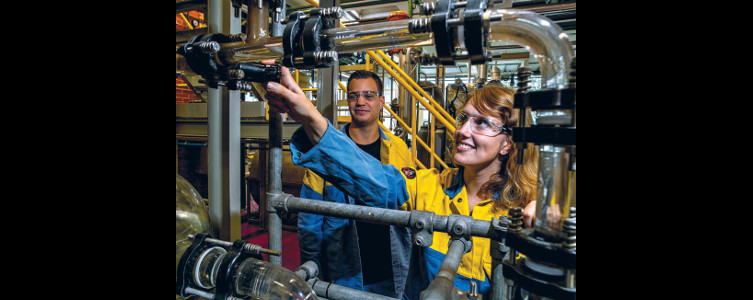
“We invest in our people, in their job satisfaction and their ability to reach retirement in good health,” Theo continues. “Each employee contributes to a fund, which pays to support colleagues in special need of assistance — perhaps to take care of a sick family member. It’s just one example of how we are much more than a business.”
Employees give back a lot as well, through hard work, but also with their enormous commitment. Many of them contribute to the Ideas Make a Difference programme (I-MAD), for example, coming up with very practical ideas to improve ways of working or save money.
Generations of employees have worked for the steel plant. In many cases, they started their career at Tata Steel’s Academy, which was founded in 1939. It is the only technical vocational school in the Netherlands still owned by its founding business.
“It was voted the best technical vocational school in the Netherlands last year, and we are very proud and fortunate to have the academy here in IJmuiden,” Theo adds. “We offer young people an exciting career at an industrial icon that continues to amaze even after decades in service.”
The academy also plays an important role in attracting talent in a job market in which technically schooled people are scarce. “Our future depends on having technically schooled employees on all levels, and the academy provides for that need, also focusing on new digital skills such as advanced analytics and leadership skills,” says Theo. “This does not only apply to new employees, but is also important for present employees, which the academy supports with knowledge and skills boosting education.”
Serving the Community
Jamsetji Tata’s philosophy was that the community is not just another stakeholder in the business but the very purpose of its existence. The values upon which he founded his business 150 years ago continue to guide Tata Steel in serving communities to this day.
Much of the 750-hectare IJmuiden site is not actually located in IJmuiden, which is situated opposite the North Sea Canal; it is spread across three municipalities — Heemskerk, Velsen and Beverwijk. Over the past century, as the site successfully took its position as one of the country’s foundation industries, the region — called IJmond — grew to become an economic powerhouse. The population in the neighbouring towns grew fast, with Heemskerk adding over 600 percent.
“A century of steelmaking has brought wealth and prosperity to the region,” says Hans van den Berg, hub director. “We are an attractive and responsible employer, and many people in the region are indirectly employed by our suppliers. Our technical academy draws young people from the area and further afield as well.”

IJmuiden also organises various programmes, including an annual Girls’ Day, to make school pupils enthusiastic about technology and engineering. Then there's the Future Generations programme, which includes a slate of activities for the wellbeing of children in the communities around the site in IJmuiden. The Marquetteloop in Heemskerk, for example, is an annual running event that is part of the Kids of Steel programme, which is active in the UK as well.
Additionally, Tata Steel sponsors Telstar, a local football club that organises sporting activities for kids, and social projects aimed at supporting the positive development of kids in need. As part of the Children’s Council, primary school kids are invited to discuss some of the company’s challenges with the IJmuiden management. By involving them in some of the big issues that relate to the IJmuiden site, the company gains an interesting perspective and the children have fun learning valuable things about the business.
Tata Steel’s annual chess tournament, which celebrated its 80th edition this year, takes place in the village of Wijk aan Zee, next to the site. The world-renowned event attracts visitors from all over the world, and is an important source of income for the community during the slow winter months.
“Tata Steel wants to be a good neighbour,” says Hans. “We always try to inform our neighbours if there is an issue that may affect them before they hear it on the news. We are in active dialogue with interested people from the community, organise Neighbours’ Days and offer anyone interested free site tours in our steam train.”
Serving the community remains one of the pillars of Tata Steel from India to IJmuiden.
Author Ivo Pommerel is the content manager for Tata Steel Europe.




